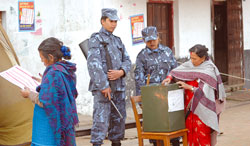|
|
With more than 10 percent of Nepalis now living outside Nepal at any given time, experts say future elections will have to take into account overseas voters.
The first test of this could be the election for an assembly to draft a new constitution which could take place early next year. Allowing Nepalis outside Nepal to vote may not be as easy as it seems because there are no accurate figures regarding Nepalis living abroad.
There is a large population of migrant workers in India who don't stay in one place and there are tens of thousands of Nepalis staying illegally in east Asia and Europe. In addition, there are anywhere up to 200,000 internally displaced within Nepal who will also need to vote.
On the plus side, there are Nepali experts who have conducted UN supervised elections in Iraq, Afghanistan, Cambodia and East Timor and have experience in diaspora voting.
"It will be a first in Nepali history, but it can be done," says Naresh Bhatta, who has worked in Kosovo and most recently as an electoral operation adviser in Iraq. "The right to vote is a basic human right, we must give everyone the chance even if they don't live in their home."
Electoral experts also see a great need to educate voters, especially for the constituent assembly elections. A recent poll showed only a quarter of Nepalis may actually understand the purpose of such an election.
And if the constituent assembly election happens without the Maoists agreeing to decommission their arms, many internally displaced people may not go back to their home villages. A mechanism must be found to allow them to vote.
Last month, the Geneva-based International Organisation on Migration (IOM) sent an assessment team to Nepal to look into the political rights of Nepal's internally displaced and refugees. The team's action plan recommends that the political forces balance the need for keeping the peace process moving forward with the recognition that the constituent assembly election will need planning and a realistic timeframe.
Speaking at a meeting in Geneva earlier this month's IOM's director general Brunson McKinley said: "Maintaining a focus on all the people of Nepal including those displaced by conflict is essential for the future stability of Nepal."
Bhatta and his team say besides worries about disenfranchisement of the internally displaced and migrant workers, there is a need to keep the ceasefire and political transition on track. Citizenship and electoral mechanisms for the constituent assembly polls, including constituencies, must be ironed out. Then there are the nitty-gritties: voter registration, voter IDs, voter education and balloting.
"We have seen from other countries that with careful planning and enough time it can be done, "says Bhatta. "The trouble is we know who went abroad to work but we're not sure about who came back. Out-of-country voting will be a challenge."



